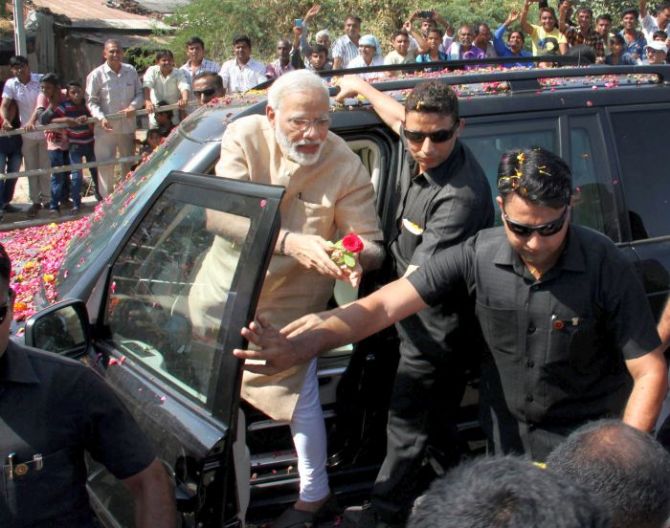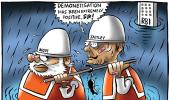From banking reform to financial reconstruction, the bullet train, Navi Mumbai airport, choosing a new medium fighter aircraft to be made in India... time is running out for Modi.
How could a leader as energetic and astute as Modi have left it for so late, asks Shekhar Gupta.

History tells us there are two kinds of conquerors: One who consolidates after a victory and settles down to govern, improves the lot of the people, and remains content within the empire.
The second is the constant campaigner, for whom conquest is an obsessive fix.
It is risky now to use examples from Mughal history although it is tempting to compare the relative legacies of a significant dynast in either category -- Akbar and Aurangzeb -- and see how history judges either.
It is safer, and more illustrative, to talk about Emperor Ashoka, who represents both types in one life: A disruptive conqueror in the first phase of his reign, and a calm, reflective, and reformist ruler in the second, after Kalinga.
This is when he made a lasting impact, and laid the principles of modern governance and foundations of an India strong enough to last for millennia.
It is that Ashoka, in his second innings, whose symbols adorn our national emblems and flag.
The era of military conquest ended long ago. Today's leaders campaign for political power through elections, alliances, and manoeuvres.
What Narendra D Modi recorded in the summer of 2014 was a political victory unparalleled in India's history. Members of the Nehru-Gandhi dynasty may have won more seats than him in the past, but never was an incumbent defeated so humiliatingly and that too by an outsider.
The two-thirds point of his reign after that is a good time for Modi to review what kind of a ruler he has been so far.
On honest reflection, he might agree that he and his generals never rested their cavalries. They have been incessantly in campaign mode.
It isn't just that the government and the party have become single-focus election-winning machines.
Besides the targeting of rivals through State agencies, opening up new fronts in distant states where usually regional satraps rule and the Bharatiya Janata Party hardly exists, the government has also been unable to break out of the rhetoric that won it the election.
All of these have distracted it from the boring, patient, and hard grind of governance. The result is today's low mood.
This predicament is complicated by the fact that it has come when there isn't sufficient time left for course correction and recovering lost ground.
Going ahead, there is a state election every six months. And each one, in these 18 months leading to the big one, is crucial.
No successful leader rests on his laurels. It isn't, therefore, our case that Modi should have frozen his political expansion.
Truly great leaders, however, have the skill and the patience to prioritise their time and mind space.
Even more important than these is their political capital. It is at its peak in the early honeymoon phase and then wanes.
The most difficult decisions should be taken when public support is at its strongest and you have the time to see your efforts bear fruit.
In its campaigning obsession the Modi government wasted that opportunity. It has left hard decisions, particularly on the economy, for too late. Hence the current crisis.
There were three prongs to the spectacular BJP/Modi campaign in 2014: Acchhe din (better days), a muscular national security policy, and the fight against corruption.
Of these, the third had packed the greatest degree of hype: The promise of recovering lakhs of crores of stolen money, the return of so much Indian black money that every Indian could be sent a gift cheque of Rs 15 lakh, and the prompt arrest and prosecution of all corrupt and powerful people, beginning of course with Robert Vadra.
This is the horse a clever ruler would have gotten off first after it had taken it to his destination. The Modi government fell in love with it.
The balance sheet at, say, the 42-month mark has very little to show on this count: A few raids and meandering cases against defeated rivals, a new reign of tax terror, and very little recovered wealth.
If anything, the one powerful 'crony-capitalist crook', Vijay Mallya, the government could have made an example of escaped and sadistically rubs his finger in India's eye from Britain.
Demonetisation was one audacious, if poorly thought out, move which, it is evident now, failed to uncover black money, whatever it may have done to enhance the use of digital cash.
It ended up being disruption for disruption's sake. It left the unorganised sector and supply chains devastated and combined with an already slowing economy to produce this awful job distress.
It also narrowed the government's stabilisation window for the goods and services tax by creating a scorched earth situation for the micro and small-scale economy in the months leading to GST implementation.
A government in a permanent mode of political expansion left major policy decisions waiting. The bullet train is an example.
If it was to take five years to build, the smart time to launch the project was the government's first year.
By the end of its term, much progress would have been visible on the ground. It's too late for that now.
The next 18 months is too short a period for visible progress, while giving the Opposition the chance to ridicule a good idea as wasteful in times of economic distress.
Similarly, heavy lifting like bank consolidation, cleaning up the bad debt mountains, and large infrastructure projects such as Mumbai's coastal road and new airport are yet to see a brick laid.
For a government that takes pride in its project implementation ability, it's embarrassing that work hasn't even begun on its political, showpiece projects like the offshore Shivaji memorial in Mumbai.
The larger 'Make in India' project has stalled, and barring the two-squadron Rafale order, defence production or acquisition shows no breakthrough.
Since this government lays such store by its commitment to modernising the defence forces, it is instructive to note that the only acquisitions in its three years were deliveries on orders by the United Progressive Alliance.
Military acquisitions do have a long gestation period, but even three-and-a-half years is too much time spent without resolving the fundamental issue of choosing an assault rifle for the Army.
From banking reform to financial reconstruction, the bullet train, Navi Mumbai airport, and choosing a new medium fighter aircraft to be made in India, time is running out in this NDA term.
How could a leader as energetic and astute as Modi have left it for so late?
Here's a hypothesis. The headiness of 2014 and subsequent state election wins persuaded the BJP to take a second term for granted.
It presumed it had the time and space to use its first term mainly for political conquest of all of India and destruction of all Opposition, national or regional, however small and distant.
Once total, unchallenged power was secured, there will be plenty of time in subsequent terms for the more thankless job of governance, like a dominant team taking it easy in the first innings and leaving the hard work for the second.
But cricket isn't the only game of glorious uncertainties.
Politics, if anything, is less forgiving, and doesn't appreciate complacency. That is one explanation for the Modi government's waning elan.
By special arrangement with ThePrint
IMAGE: Prime Minister Narendra D Modi during a roadshow in Vadnagar, Gujarat, October 8, 2017. Photograph: PTI Photo










